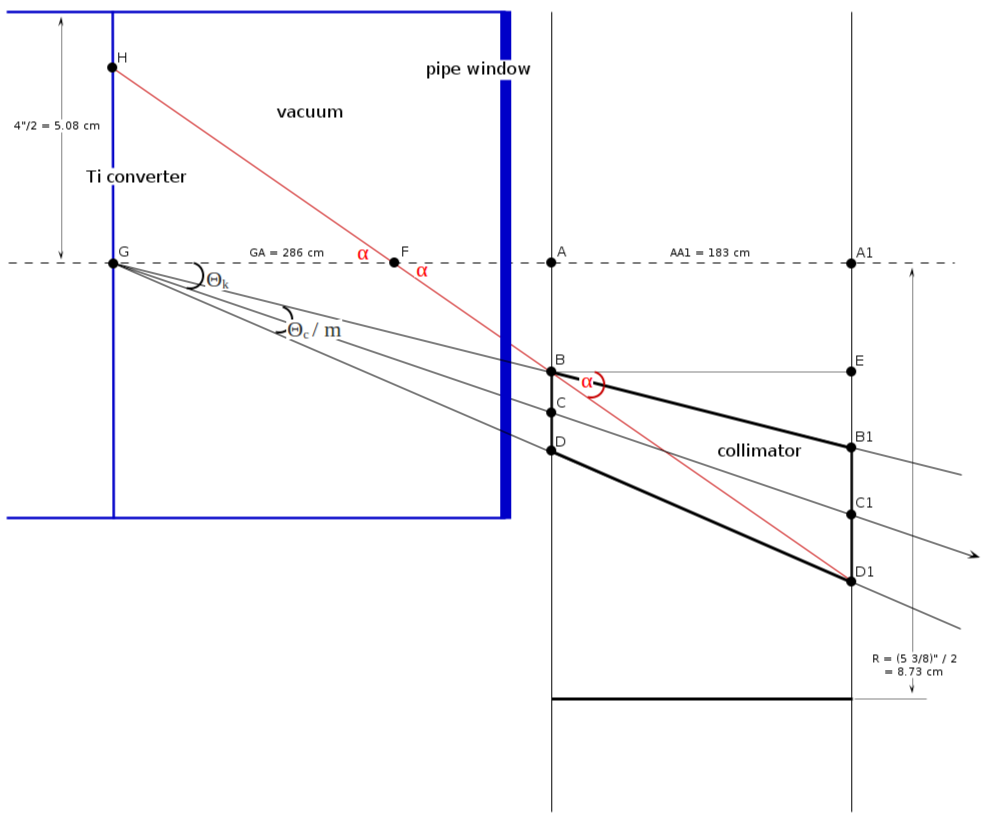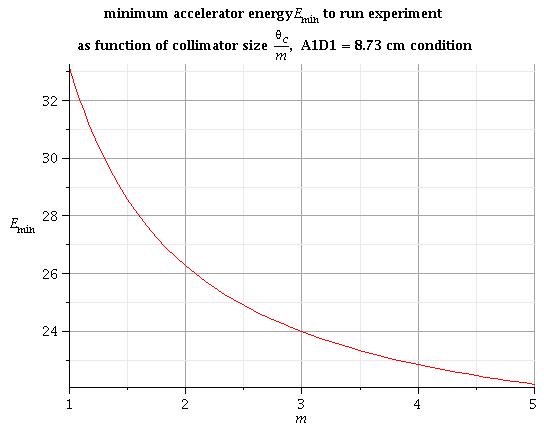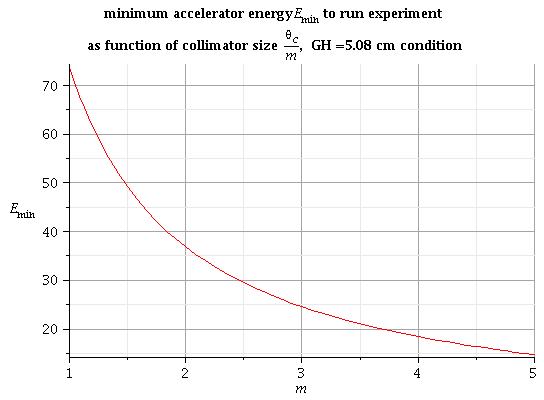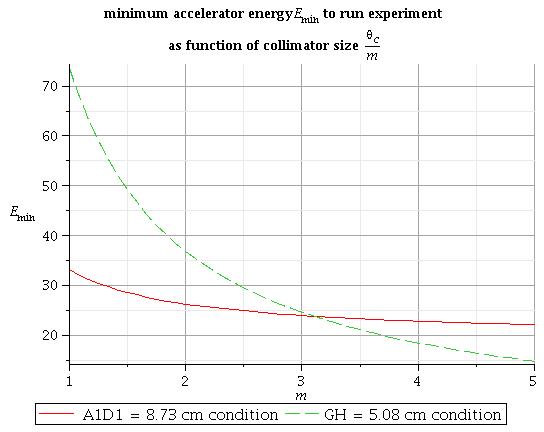Difference between revisions of "Minimum accelerator energy to run experiment"
| (46 intermediate revisions by one other user not shown) | |||
| Line 1: | Line 1: | ||
| − | [ | + | [https://wiki.iac.isu.edu/index.php/Roman_calculation Go Back] |
=general setup= | =general setup= | ||
| − | [[File:minimum_energy_condition.png | + | [[File:minimum_energy_condition.png]] |
| − | = fitting the collimator size into the hole | + | = fitting the collimator size into the hole through the concrete wall= |
I can express the distance <math>A_1D_1</math> as function of collimator size <math>\Theta_C/m</math> and electron beam energy E: | I can express the distance <math>A_1D_1</math> as function of collimator size <math>\Theta_C/m</math> and electron beam energy E: | ||
| − | + | [[File:formula_cond11.png]] | |
| − | |||
| − | + | To fit the collimator size into the hole through the concrete wall with radius R = 8.73 cm we need to solve equation: | |
| − | <math> | + | <math>A_1D_1(E,\ \Theta_C/m) = 8.73\ cm</math> |
| − | 1) | + | 1) some solutions of this equation for different collimator sizes m are: |
| − | <math> | + | <math>m = 1 \Rightarrow E_{min} = 33.1\ MeV </math><br> |
| − | + | <math>m = 2 \Rightarrow E_{min} = 26.3\ MeV </math><br> | |
| + | <math>m = 4 \Rightarrow E_{min} = 22.8\ MeV </math><br> | ||
| − | 2) | + | 2) in general for arbitrary collimator size m the solutions are: |
| − | + | [[File:energy_condition1.jpeg]] | |
| − | |||
| − | + | All energies above this line is good to run experiment for condition above | |
| − | + | =critical collimator line condition= | |
| − | |||
| − | + | Also I can express the distance <math>GH</math> as function of collimator size <math>\Theta_C/m</math> and electron beam energy E: | |
| − | + | ||
| − | [[File: | + | [[File:formula_cond21.png]] |
| − | + | ||
| − | + | If I would like that nothing hitting the 4" box to go through the collimator I need to solve equation: | |
| − | |||
| − | |||
| − | |||
| − | |||
| − | |||
| − | |||
| − | |||
| − | |||
| − | <math> | + | <math>GH(E,\ \Theta_C/m) = 5.08\ cm</math> |
| − | + | 1) some solutions of this equation for different collimator sizes m are: | |
| − | <math> E_{min} = 18.4\ MeV </math> | + | <math>m = 1 \Rightarrow E_{min} = 73.7\ MeV </math><br> |
| + | <math>m = 2 \Rightarrow E_{min} = 36.9\ MeV </math><br> | ||
| + | <math>m = 4 \Rightarrow E_{min} = 18.4\ MeV </math><br> | ||
| − | + | 2) in general for arbitrary collimator size m the solutions are: | |
| − | [[File: | + | [[File:energy_condition2.jpeg]] |
| − | All | + | All energies above this line is good to run experiment for condition above |
| − | =both | + | =both solutions are together= |
| − | [[File: | + | [[File:energy_condition12.jpeg]] |
| − | All | + | All energies above this lines is good to run experiment for both conditions above |
[http://wiki.iac.isu.edu/index.php/PhotoFission_with_Polarized_Photons_from_HRRL Go Back] | [http://wiki.iac.isu.edu/index.php/PhotoFission_with_Polarized_Photons_from_HRRL Go Back] | ||
Latest revision as of 19:03, 24 May 2012
general setup
fitting the collimator size into the hole through the concrete wall
I can express the distance as function of collimator size and electron beam energy E:
To fit the collimator size into the hole through the concrete wall with radius R = 8.73 cm we need to solve equation:
1) some solutions of this equation for different collimator sizes m are:
2) in general for arbitrary collimator size m the solutions are:
All energies above this line is good to run experiment for condition above
critical collimator line condition
Also I can express the distance as function of collimator size and electron beam energy E:
If I would like that nothing hitting the 4" box to go through the collimator I need to solve equation:
1) some solutions of this equation for different collimator sizes m are:
2) in general for arbitrary collimator size m the solutions are:
All energies above this line is good to run experiment for condition above
both solutions are together
All energies above this lines is good to run experiment for both conditions above




